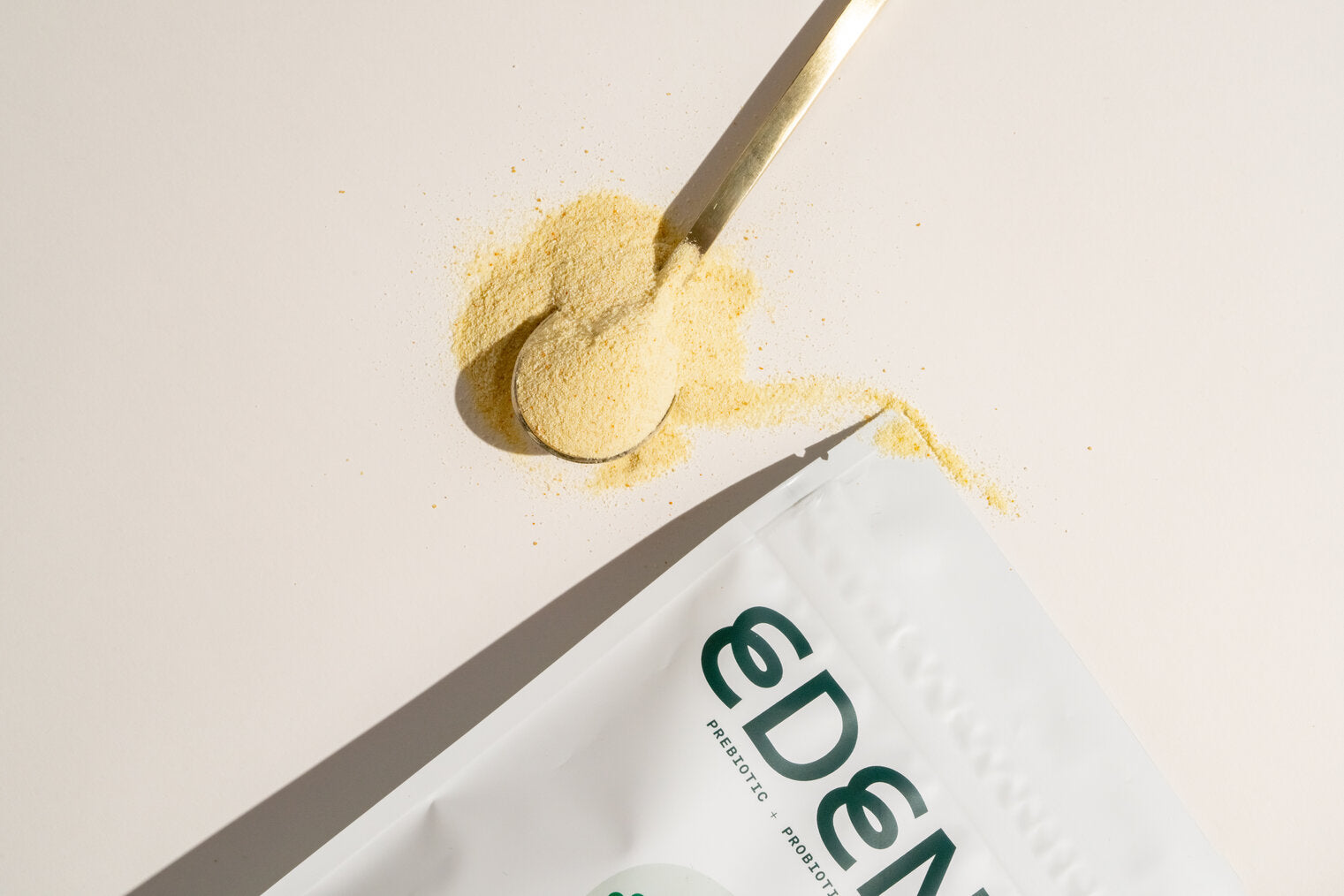People sometimes ask, "is guar gum bad for you," but the reality is guar gum gets a bad rap as an additive in food products; it’s actually a beneficial prebiotic fiber that supports metabolic health by improving gut health, gastrointestinal regularity, and may help with weight management and energy levels.
[[mailing_list]]
Prebiotics are made up of different forms of fiber and are the food source for probiotics — specific microorganisms living in your gut or consumed through food that confer a health benefit. Prebiotics are essential components to achieving and maintaining a healthy gut, and each prebiotic fiber offers its own unique set of benefits. Out of 28,000 possibilities, scientists carefully selected the 14 most effective ingredients to formulate Eden’s Synbiotic Supplement to give your good gut microbes what they need to thrive. Guar gum is one of the five prebiotic fibers chosen — and here’s why.
[[product]]
What are prebiotic fibers?
All prebiotics are classified as fibers. Fiber has been shown to nourish microorganisms so that they continue to grow and diversify. The more varied your gut bacteria are, the more they contribute to heightened immunity and reduced inflammation — both of which are associated with more positive health outcomes (including reduced risk of diabetes, cardiovascular disease, metabolic disease, and more).
Prebiotic fibers, in particular, selectively stimulate the growth and metabolic activity of gut microbes. They are digested quickly by microbes that produce beneficial molecules for humans, including the important and beneficial short-chain fatty acids (SCFAs) — butyrate, acetate, and propionate — which are believed to play a role in regulating appetite, immune system function, and blood sugar. By definition, prebiotics:
- Are not digestible by mammals
- Are fermented (digested) by microbes
- Improve activity and viability of beneficial microbes
SCFAs and other bioactives that control metabolic and immunological pathways are produced by microbes that ferment fiber. SCFAs are chemicals that have many advantages for human health, including:
- Lowered risk of diseases (e.g., colorectal cancer)
- Lowered intestinal inflammation
- Better regulated blood sugar
- Improved absorption of vitamins and minerals
- Increased satiety and reduced hunger
Prebiotics can't have a positive impact if the bacteria that ferment them aren't already present in your gut, which is why some people think that simply eating them won't do much good. Yet, since a wide variety of bacteria may ferment fiber, missing one or two species is unlikely to have a significant impact. Numerous credible studies confirm this, demonstrating that the majority of people have an abundance of fiber-fermenting bacteria in their stomachs.
So, if probiotics can help treat disease, and prebiotics feed probiotics (and thus might enhance the latter’s efficacy), the question naturally follows: Shouldn’t you just take both? The answer is yes. And you can do so in one of two ways (or, ideally, a combination of both):
-
By tailoring your diet to include a healthy balance of prebiotic and probiotic foods — see Discover the best foods for a healthy gut.
- By supplementing your diet with a precisely balanced blend of all-natural prebiotic fibers and probiotic strains designed to optimize the health of your gut. Eden’s Synbiotic Superblend is one such powerhouse supplement, and includes 5 prebiotic fibers, 4 probiotics, and 5 polyphenols — a blend formulated to optimize your digestive, metabolic, cardiovascular, and immune health.
What is guar gum? Products that contain guar gum
Guar gum is a fine powder made from the guar bean (also known as the cluster bean) that has beneficial effects on satiety, energy levels, and stool quality because of its prebiotic properties. The white or yellow powder dissolves in water and forms a viscous gel. It is commonly used as a thickening agent, stabilizer, and emulsifier in a wide range of food products to improve the texture, consistency, and mouthfeel of various products such as ice cream, yogurt, sauces, dressings, and baked goods. It can help prevent the formation of ice crystals, improve the suspension of solids, and enhance the overall stability of food formulations. The health benefits guar gum offers can be obtained by eating the guar bean (consumed similarly to green beans and popular in Eastern cooking) or consuming guar gum, which is found in most shelf-stable products or sold as a cooking ingredient in the baking section.
Partially hydrolyzed guar gum (PHGG), also known as hydrolyzed guar gum or enzymatically hydrolyzed guar gum, is a modified form of guar gum. It is produced by breaking down the long chains of sugars in guar gum to smaller segments, resulting in a more water-soluble, less viscous powder.
The Food and Drug Administration (FDA) lists guar gum as Generally Recognized as Safe (GRAS) status, meaning that anyone can add it to a nutritional supplement. It's worth noting that while guar gum is generally considered safe for consumption, some individuals may be sensitive or allergic to it. As with any food additive, it's recommended to read product labels and consult with a healthcare professional if you have any specific concerns or allergies.
The health benefits of guar gum and PHGG
Guar gum and PHGG have many health benefits, including:
Bowel regularity: Use of Guar gum helps normalize the moisture content of stool, both softening stool that is causing constipation and absorbing excess liquid in those with diarrhea. This dual action of reducing both constipation and diarrhea makes guar fiber notably beneficial for alleviating the conditions and symptoms associated with irritable bowel syndrome (IBS). Excessive consumption may cause the opposite effect, although PHGG’s reduced viscosity and improved solubility make it easier to digest and less likely to ferment excessively in the gut. Learn more: Bowel movements: How to stay regular.
Improved gut health. The smaller size of the hydrolyzed segments makes PHGG more fermentable by gut bacteria, leading to increased production of beneficial SCFAs and probiotic bacteria in the colon. Learn more: How does a healthy gut affect digestive health?
Weight management. Guar gum adds bulk to the diet without significantly contributing to caloric intake, which may help with controlling food intake. The addition of guar gum to foods can increase their viscosity and promote a feeling of fullness or satiety, potentially aiding in weight management by reducing appetite, according to a 2016 clinical review. This same paper opined that guar fiber works by delaying the colonic transit time of digested food, stimulating the satiety hormone cholecystokinin (CCK), and inducing a prolonged perception of post-meal satiation and satiety effects.
Enhanced energy. In a pilot study, participants who took Eden’s Synbiotic Supplement, which contains guar gum as one of five prebiotic fibers (blended with a menu of complementary probiotics and polyphenols), reported improved energy levels, which scientists believe may be attributed in part to the guar gum. It makes sense that this fiber reduces feelings of fatigue, as gut inflammation — which is what fibers help alleviate — has been associated with chronic fatigue syndrome in clinical studies. In fact, fatigue occurs in nearly half of the people who have inflammatory bowel disease (IBD) and other GI disorders, and many patients who have chronic fatigue syndrome complain about gut dysfunction. There are many reasons why this is the case, including malabsorption and alterations to the gut-brain connection. Learn more: Can a healthier gut improve your energy levels?
Other attributes of guar gum are still being studied, but results to date are too preliminary to form any solid conclusions:
Glucose management. As a soluble fiber, guar gum can slow down the absorption of carbohydrates, leading to a more gradual rise in blood glucose levels after meals. However, individual responses appear to vary greatly. A 2023 meta-analysis concluded that guar gum supplementation led to significantly decreased levels of hemoglobin A1C for diabetic and non-diabetic patients, but only decreased fasting blood glucose levels at high doses in patients with type 2 diabetes (T2D) and not in other sub-groups.
Cholesterol management. Some studies suggest that guar gum may have a modest effect on reducing total cholesterol and LDL (bad) cholesterol levels, indicating the potential to prevent cardiovascular disease. As a soluble fiber, guar gum can bind to bile acids in the intestine and inhibit their reabsorption, which can result in the excretion of more cholesterol. A 2021 meta-analysis showed that guar gum may reduce total cholesterol (TC) and LDL-C levels, but has no effect on HDL-C or TG level. While this suggests that guar gum may promote lipid health and help prevent CVD, studies with larger sample sizes and longer trial periods are still needed to refine and verify conclusions. Regarding PHGG, the study authors caution that whether the decrease of viscosity will affect the ability of PHGG to reduce blood lipid levels still needs more research.
While the above metabolic and cardiovascular impacts are still unclear with guar gum, many other prebiotic fibers — such as the resistant starch, barley beta glucan, locust bean gum, and oat bran that are contained in Eden’s Synbiotic Supplement — do indeed have documented benefits in both of these regards. Learn more: How does the gut affect heart health?
Key takeaways
Prebiotic fibers have numerous health benefits, including their positive impact upon the bacterial composition of your gut microbiome. Guar gum is a prebiotic soluble fiber that is associated with beneficial effects on gut health, bowel regularity, energy levels, and weight management. Supplements containing guar gum are generally safe to consume, but be sure to work with your healthcare provider before starting any supplement — especially if you have any food allergies, intolerances, particular medical conditions, or are taking any medications.

